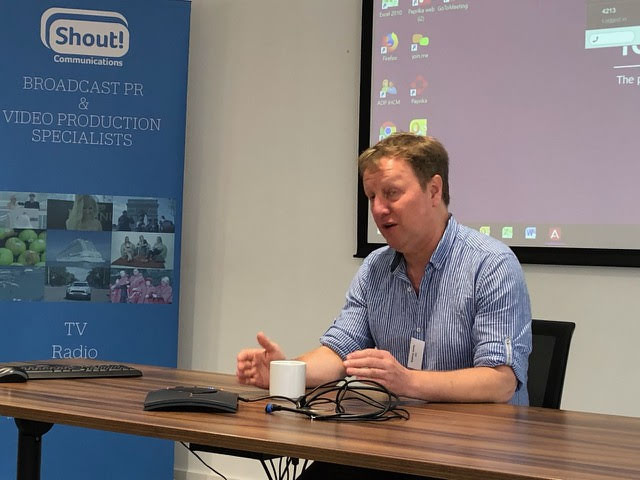Bad news is good news for journalists, Andrew Verity told our audience at the latest Shout! Communications Small Talk. Andrew reports for radio and television across a range of BBC programmes. His main focus is economics, but he also works on investigative stories for programmes like Panorama.
Bad news, he explained, compels attention and that is, of course, what our clients want from broadcast journalists. But before we dismissed his advice out of hand he went on to say that showing how a company is coping well in adversity can be a win-win situation for both journalists and PR. Or, as Andrew put it, a good story in a difficult predicament!
As we all know, some journalists can be resistant to taking any PR stories but Andrew claimed there are ways with which we can ingratiate ourselves:
- More often than not emails don’t work. We all drown in emails and so do journalists. If you really, really HAVE to send one make sure there’s a subject line that’s going to attract attention. That’s up to you, but my own view is that bland isn’t good enough.
- Think who you know client wise who might be useful for a journalist. As a former journalist myself I think I can say that, under the pressure of deadlines, it’s easy to fall back on the same spokespeople. As PR professionals though we can pro-actively offer alternative spokespeople, albeit ones who are our clients.
- If these spokespeople are female (and, even better, young) your chances of success increase considerably. At the many Small and Big Talks Shout! Communications has hosted, we have heard several times how the major national broadcasters are totting up their diversity numbers at the end of each week. They are all making positive steps to increase diversity on our screens and airwaves and this is an opportunity for all of us working in PR.
- Another invaluable service we can offer involves information. What, for example, is trending on Twitter, or Facebook of Instagram… journalists aren’t always aware of what’s happening the social media sphere and may well be grateful if you flagged up a possible story.
- The value of good information cannot be underestimated either. If you can help them quickly understand a complex situation you are doing them a favour.
- Make it human. Business stories can seem a bit dry, so you need to demonstrate WHY a particular issue matters. Broadcasting is by its nature broad, wanting to appeal to the biggest possible audience and that audience is thinking about how any story relates to THEM.
- And stop fighting the last war! In business and economics there are stories that go round and round but sometimes the world changes. Inflation, Andrew pointed out, hasn’t really been an issue for decades. Broadcast news needs to be relevant to the audience and, in an effort to attract younger viewers and listeners, those stories need to appeal to them. That means more stories need to be suitable for online.
Thanks to Andrew Verity for taking the time to speak to us and to Four Communications for hosting our event.
Our next Small Talk features the BBC’s Director of Communications and Corporate Affairs, John Shield, on Tuesday 23rd July. The event is open to anyone signed up for our newsletter. To book a place email Sam@shoutcommunications.co.uk.



